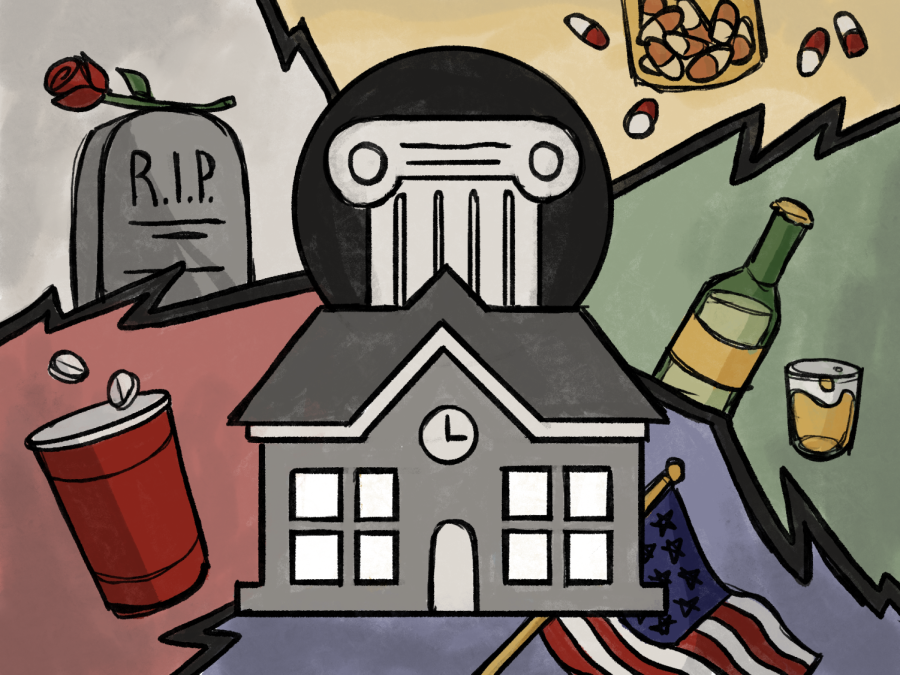OPINION: Seek a healthy college life, not a Greek life
Hazing, rape culture and segregation practices create a dangerous environment on college campuses.
In 2019, protestors rallied around sanctioning the popular Greek life society on college campuses countrywide. The protests came in light of the death of 20-year-old Alex Beletsis, who was attending the University of California, Santa Cruz. His death was caused by intoxication and falling out of an 18-foot-high window. Theta Chi, the fraternity responsible for his death, attempted to cover up the cause of his passing during a university-based investigation. When daylight hit the brutal reality of Beletsis’ death, the nation was up in a storm.
The protests died out in a matter of months, USA Today reported. The message, however, did not. Greek life is a dangerous and horrific addition to America’s college campuses. The practice of hazing, the presence of rape culture and the influence of old-time segregation practices render it one of America’s most shocking pastimes. In spite of repeated scandal and controversy – from the Brock Turner injustices to common deaths and injuries – Greek life remains wedged deeply into the foundations of college life.
Greek life is denoted as the fraternities and sororities that have populated campuses for decades. The National Panhellenic Council’s website preaches a message of unity, love and togetherness, working together to enrich the lives of college students everywhere. When orientation ends and nighttime hits, however, Greek life takes on a different course. Young men in fraternities, dubbed as frat boys, are in charge of most universities’ parties and nightlife. In these social gatherings, the worst comes out and takes over.
In order to join a fraternity, recruits often undertake a period of extreme hazing, defined by dehumanizing humiliation, including drinking games that border on alcohol poisoning, ritualistic pranks and dangerous stunts that can only be described as suicidal.
The University of Maryland reports that there has been at least one hazing-related death every year since 1970. In 2021, there were four. This number may seem low, but any organization that preaches ritualistic endangerment of life during a time where students are meant to live full and enriching lives is disgusting. Any number of deaths is too high a number.
If a student is not white in origin, then they might as well not even show. America’s first fraternity, Beta Phi, was founded at William and Mary University in 1776 and was fully segregated. The same pattern continued around American universities throughout history. The exact number of fraternities and sororities founded is disputed. CNN, however, reported that the Class of 2021 had a total of 660,000 students belonging to Greek life. Almost all of the fraternities and sororities were founded before the 1960s. As a result, in the South, most were segregated. This racist practice lives on today.
In 2020, a white Vanderbilt student wearing a durag was recorded spouting racial slurs aimed at a Black counterpart. At Washington University in St. Louis, white sorority girls were recorded yelling slurs and openly fetishizing Black men in 2020. Among other incidents, blackface is not uncommon.
California Polytechnic State University, San Luis Obispo had an incident in 2018 where their Lambda Phi Alpha chapter was dismissed for a blackface party. Vox reported that 73% of all Greek life students are white and upper class. Partnering itself with old racist values and modern day forms of racism, Greek life is the last place any student of color wants to find themselves.
Then there lies the issue of rape culture. Vox found that women in Greek life are 76% more likely to experience sexual assault than any other demographic on college campuses. It is not surprising that convicted rapist Brock Turner’s night of infamy took place following a routine Stanford Kappa Alpha party.
The terrorizing practice of roofying, or the nonconsensual ingestion of rohypnol and other forms of anesthetic, is not uncommon at Greek life events. The concept of date rape that women fear when headed out for a night at the town is synonymous with fraternities and sororities.
Worst of all, Greek life organizations are known for their coverups. After all, Beletsis’ death raised concerns over a connection between UCSC’s Theta Chi chapter and the university’s Chancellor, George Blumenthal. Of course, this directly contrasts California law.
California enforces Matt’s Law, named after Matthew Carrington who died after a hazing incident at California State University, Chico, collapsing and dying in the chapter house’s basement. The law supposedly grants prosecutors the power to levy charges against Greek life organizations for hazing deaths. Unfortunately, this, however, is not put into effect often.
Universities meet scandals with a standard playbook: announce an investigation, ask questions, punish the students and then let the fraternities and sororities be.
The reason it is so difficult to levy punitive measures on Panhellenic chapters is because of their deep financial ties. Organizations, built by white landowning aristocrats, quite obviously own a lot of land. Bloomberg’s John Hechinger found that the Panhellenic Council has ties to $3 billion worth of land. They fund a lot of housing for a lot of students. Dismissing their chapters would mean that students would have to individually buy that land themselves.
As evident, the Panhellenic chapters that dominate America’s college system are wedged in. But it does not have to always be that way. Rallying for reform or abolition does not have to be locked to a single shocking event, as Beletsis’ death shows. The upcoming classes entering into universities have to avoid the temptation of joining chapters and seek better social spheres to surround themselves in.
It’s 2023. Cult-like organizations with cult-like origins cannot be allowed to expand and grow. Students need to seek a healthy life, not a Greek life.


